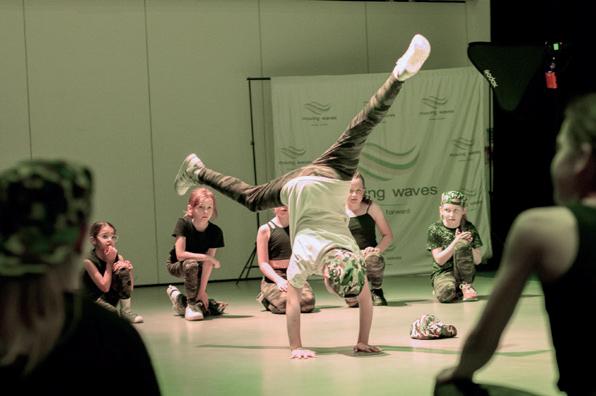THUNDERBOOTS
Everyone is Good at Something Understanding dyslexia I was diagnosed with dyslexia when I was 21 and halfway through an English degree at university. Having an official diagnosis from the Educational Psychologist was a huge relief; it helped me understand how my brain works and what my strengths and weaknesses are. I’m good at generating ideas, but my spelling and handwriting are awful. Years later, I was chatting to a friend who was telling me about her son’s struggles with reading at school and how he felt stupid. Right then, I decided that I wanted to write a book which recognised different learning styles, normalised finding reading and writing hard and, most crucially, celebrated Trixie’s absolute favourite . because she could run . .
to warm up Miss Fry always asked them es. first by doing some stretch
lesson was PE
from side ‘Stretch up high, then reach your toes.’ to side before you touch It was a lot to remember.
‘Whoops!’
jump . . .
cartwheel . . .
Windlesham House School
and dance lots and lots and
lots!
individual strengths. After all, everyone is good at something. Although Thunderboots was inspired by my own experiences of dyslexia (‘Thunderboots’ was my Grandpa’s nickname for me as a child), Trixie’s experiences in the story won’t be the same as that of the rest of the estimated 10% of the population who are also dyslexic - like any neurodivergent condition, everyone experiences it differently. Hopefully what Thunderboots does is normalise neurodiversity and allow teachers, parents and readers to discuss it. Despite so many people being dyslexic, there are very few books that feature dyslexic characters. My editors at Oxford Children’s Press consulted the British Dyslexia Association during the editing process to ensure Thunderboots sensitively and accurately represents a child’s experience of dyslexia. The illustrator, Rebecca Ashdown, also has a husband and daughter who are dyslexic and I think her personal experiences really helped bring Trixie to life. During events, I always make a point of mentioning that I’m dyslexic because I think it’s important for children to realise authors can be, just like I think it’s important for them to read books about characters who think differently. The stories we read should reflect the world around us and celebrate the ways in which we’re all different, as well as the same. NAOMI JONES Author www.naomiandjamesjones.com
Outstanding opportunities | Nestled in the South Downs | West Sussex RH20 4AY Girls and boys 4-13 | Day, flexi, full boarding | Weekly London and daily local buses
www.windlesham.com 01903 874700 whsadmissions@windlesham.com
EDUCATION CHOICES MAGAZINE | AUT UM N 2024 | 31


































